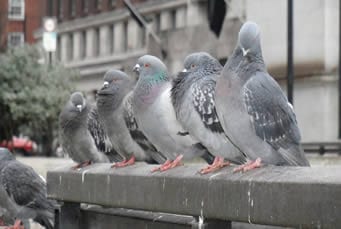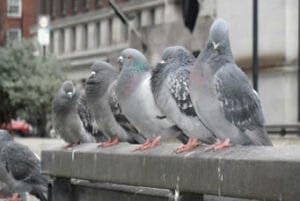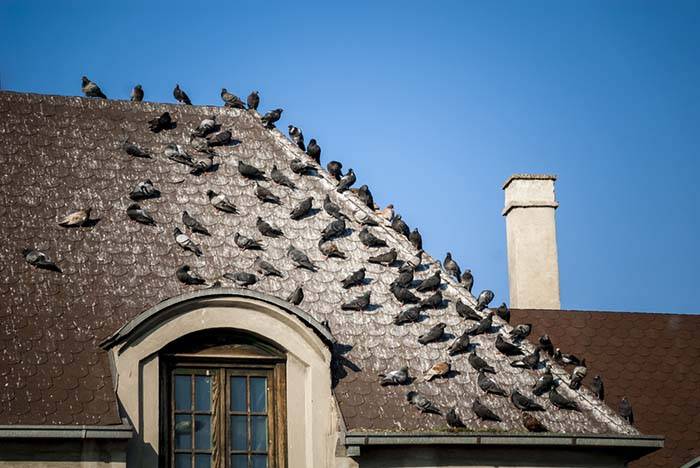
by Pigeon Patrol | Jan 25, 2022 | 4-S Gel Bird repellent, Animal Deterrent Products, Bird Deterrent Products, Bird Law, Bird Netting, Bird Spikes
It was the satirist Tom Lehrer who started the rot in 1959 with his song Poisoning Pigeons in the Park, which explained that it takes only a smidgen of strychnine and “it’s not against any religion to want to dispose of a pigeon” (though I doubt that many Buddhists or Jains would agree).
However, Woody Allen delivered the coup de grâce in his 1980 film Stardust Memories, when he referred to feral pigeons as “rats with wings”.
The term had first appeared in 1966 in an article in The New York Times, but Allen’s film reached a much wider audience. It was the final nail in the coffin for these birds – what could be more damning than to be on a par with rats? Ever since, feral pigeons have been one of the Disgusting Three, together with North American grey squirrels (‘tree rats’) and rats themselves. Their fall from grace was dramatic and, amazingly, took just a couple of decades.
Where did feral pigeons come from?
The rock pigeon Columba livia was the wild ancestor of the feral pigeon and the first bird to be domesticated, in the Middle East some 6,000 years ago. Since then its contribution to human wellbeing has been astonishing.
Until agricultural advances in quite recent times, a dovecote, rabbit warren and carp pond were the three essentials to provide fresh meat throughout the year in Europe. In addition to food, pigeons produced valuable guano so rich in nutrients that one load of it was worth 10 from any other species. In many countries, pigeon dung actually played a key part in agricultural development.
It might seem improbable that the rock pigeon, a relatively uncommon species of remote cliffs, was the first bird we domesticated. But this process did not involve capture and selective breeding – merely the provision of an alternative place to nest, usually a dovecote with rows of ledges or clay pots along its internal walls. Some designs could accommodate several thousand sitting females.
The pigeons themselves were given little food, generally flying off to forage elsewhere. Despite requiring minimal attention, each pair typically produced about 10 squabs a year. Pigeons were thus the perfect source of protein.
Darwin loved pigeons
The reliance on pigeons for food declined when it became clear that chickens were more suited to mass production. But the interest in breeding them remained: much of the first chapter of On The Origin of Species is devoted to pigeons, where Darwin describes the many breeds that can be created artificially.
Today, though, the pastimes of rearing and racing pigeons are waning in popularity. Both hobbies require a great deal of patience and dedication – commodities in short supply in the modern world.
Though pigeons were still an important food source in the 1800s, they were being stolen from lofts in large numbers to supply the newly fashionable sport of pigeon shooting: they were used as live targets in competitions.
The Hurlingham Club in London was founded in 1869 expressly for pigeon shooting. When the practice was made illegal in 1921, clay pigeon shooting was invented.
Apart from supplying us with food, fertiliser and fun, pigeons have also played a useful role in medicine. Prolactin, the hormone responsible for milk production in mammals, was first isolated in 1933 in pigeons; the same hormone stimulates the male and female birds to secrete ‘milk’ from their crops to feed their young.
Pigeons in war and peace
But pigeons are probably most famous for their ability to find their way home and deliver messages. This was first exploited 3,000 years ago, and by the fifth century BC Syria and Persia had widespread networks of message-carrying pigeons.
In 1850, Paul Julius Reuter’s fledgling news service used homing pigeons to fly the 120km between Aachen and Brussels, thereby laying the foundations for a global news agency, and the world’s first ‘airmail’ stamps were issued for the Great Barrier Pigeon-Gram Service.
The birds’ homing ability was harnessed in the two world wars: in the early 1940s, the American Signal Pigeon Corps consisted of 3,150 soldiers and 54,000 birds. Some 90 per cent of the messages got through. And these avian secret agents saved countless lives, too – of 54 Dickin Medals (the animal’s VC) awarded in World War II, 32 went to pigeons.
Feral pigeon in front of Lincoln Cathedral. © Oksana Kachkan/Getty
Are messenger pigeons still used anywhere?
Even now, homing pigeons remain a useful means of communication in remote areas. The Police Pigeon Service in Orissa, India, was retired only in 2002.
We are all beguiled by the internet, yet in 2009, as part of a PR stunt, a pigeon carried a 4GB memory stick 80km in South Africa; the country’s biggest internet service provider managed to transfer just 4 per cent of the data on the stick in the same time. Perhaps it’s hardly surprising that the Taliban banned people from keeping or using homing pigeons in Afghanistan.
Amazingly, despite decades of research, we are still not sure how pigeons find their way home over terrain they have never seen before, and with such apparent ease. Partly this confusion is because different breeds appear to rely on different cues.
The consensus is that pigeons use the sun and/or the Earth’s magnetic field on long journeys, with visual cues becoming important near their loft, though recent studies suggest that they may also use odours. Not bad for birds with very small brains.
Urban pigeon outcasts
The list goes on and on: the feral pigeon has contributed to civilisation in more ways than any other species of bird. So how – and, perhaps more importantly, why – has it become such a pariah?
The fundamental reason is that modern technology has rapidly reduced our reliance on pigeons. All that most people see today are the flocks of feral birds found in cities on every continent except Antarctica, the most obvious surviving trace of the close association between people and pigeons spanning several millennia.
It’s no wonder that feral pigeons thrive in urban areas. Buildings are perfect nest sites for these exiles, mimicking the windswept cliffs used by their ancestors. There can be few more stirring sights than masses of pigeons swooping above our city streets, occasionally with peregrines in hot pursuit.
Pigeons as tourist attractions
So it is difficult to see why feral pigeons are now so widely reviled. After all, they’re among the few birds that the average city-dweller sees regularly.
Lots of people enjoy their interactions with these charming birds, which have long drawn the crowds in tourist hotspots such as London’s Trafalgar Square and Venice’s Piazza San Marco.
And let’s not forget that feral pigeons are some of the most beautiful birds you could hope to see. Their plumage has a multitude of different colours, including metallic greens, bronzes and purples on the neck, as well as exquisite wing patterns.
Interestingly, most feral animals quickly revert to the appearance of their wild ancestors. All British mink, for instance, are now the same shade of brown as their wild relatives in North America, even though the original escapees from fur farms had a plethora of coat colours bred for the fur trade.
We don’t know why pigeons are the only feral animals to have retained the varied coloration of their domesticated ancestors.
Are feral pigeons a pest and a nuisance?
It is often said that feral pigeons are a real nuisance, but what exactly are the problems? The standard gripe is that there are too many of them and therefore they need to be controlled. It’s a familiar refrain. The accusation is also levelled at rats, magpies, crows, squirrels, foxes, badgers and deer, to name but a few so-called ‘pests’.
Of course, no one ever says what the ideal number of feral pigeons is, just that there are too many. However, there have been a handful of detailed population estimates, including one in Sheffield: 12,130 feral pigeons in a city of half a million people. This is likely to be typical of our cities.
The BTO’s Garden BirdWatch survey listed the feral pigeon as the 25th most frequently recorded species in the first quarter of 2010, whereas the wood pigeon was number five and the collared dove number eight.
Feral pigeons are also said to be ‘dirty’ because they foul streets and buildings. Personally, I find pigeon droppings much less offensive than graffiti, the chewing gum stuck on pavements and bus seats, and the masses of litter everywhere.
Picking up all of the filth left by people costs vastly more than removing pigeon poo. Likewise, protecting buildings from pigeons costs considerably less than cleaning up after domestic dogs.
Do pigeons carry disease?
Many websites list the diseases recorded in feral pigeons. How very scary. But let’s put this in context – many more diseases are known in people and their pets. Moreover, all animals carry diseases: the key issue is how often they transfer to humans, and there is little evidence of this happening with feral pigeons.
Plus, domestic pigeons often come into contact with feral pigeons but stay perfectly healthy. In other words, feral pigeons simply do not pose a significant health risk. It’s a non-issue.
In November 1855, Charles Darwin, arguably the most famous pigeon fancier of them all, sent a letter to his great friend the geologist Charles Lyell, who was about to pay him a visit. Darwin wrote: “I will show you my pigeons! Which are the greatest treat, in my opinion, that can be offered to a human being.”
How right he was!
FERAL PIGEON TERMINOLOGY: Wild, domestic or feral?
Feral pigeons live worldwide, but their wild ancestors are rare and in retreat. It’s important to get your terminology right when discussing pigeons.
Feral pigeons (sometimes called city, town or street pigeons) are descended from birds that escaped from dovecotes or other captive situations. In turn, domesticated pigeons were bred from wild rock pigeons (a species formerly known as the rock dove, but renamed in 2004).
Feral pigeons live in urban areas on every continent except Antarctica, with a global population numbering in the millions. By contrast, wild rock pigeons are now confined to outlying Scottish islands and remote parts of the Mediterranean, North Africa and western Asia.
But since it is hard to tell feral from wholly wild birds, and hybridisation is rife, it is difficult to map their respective populations accurately.
A day in the life of a city pigeon
The daily routine of a pair of pigeons in central London might look like this…
02.00 The pigeons are roosting side by side on their windowsill nest near Trafalgar Square. Their two eggs hatched a day ago.
06.00 At dawn, the female flies to the square to find food. Meanwhile, her mate gives their chicks some of his rich crop milk.
09.00 The female joins a feeding frenzy as seed is scattered (illegally) by a pigeon lover, before a warden moves the birds on.
11.00 Back at the nest, the female greets her partner with a cooing and bill-rubbing display. He then heads to St James’s Park to be fed by office workers having lunch.
15.00 After preening one another, the pair mate briefly at the nest. The female leaves again, while the male broods the squabs.
20.00 Reunited on their window ledge, the adult pigeons coo and bill-rub together before settling down for the night.
DID YOU KNOW?
- Pigeon ‘milk’ is a cottage cheese-like fluid secreted from the lining of the crop. Flamingos are the only other birds to feed their young this way.
- Experiments have shown that the humble feral pigeon can be trained to distinguish music by Bach and Stravinsky, and paintings by Monet and Picasso.
Source
Pigeon Patrol Products & Services is the leading manufacturer and distributor of bird deterrent (control) products in Canada. Pigeon Patrol products have solved pest bird problems in industrial, commercial, and residential settings since 2000, by using safe and humane bird deterrents with only bird and animal friendly solutions. At Pigeon Patrol, we manufacture and offer a variety of bird deterrents, ranging from Ultra-flex Bird Spikes with UV protection, Bird Netting, 4-S Bird Gel and the best Ultrasonic and audible sound devices on the market today.
Voted Best Canadian wholesaler for Bird Deterrent products ten years in a row.
Contact us at 1- 877– 4– NO-BIRD, (604) 585-9279 or visit our website at www.pigeonpatrol.ca
Pigeon/Pigeon Patrol / Pigeons Roosting / Vancouver Pigeon Control /Bird Spikes / Bird Control / Bird Deterrent / Pigeon Deterrent? Surrey Pigeon Control / Pest /Seagull deterrent / Vancouver Pigeon Blog / Birds Inside Home / Pigeons in the cities / Ice Pigeons/ What to do about pigeons/ sparrows , Damage by Sparrows, How To Keep Raccoons Away, Why Are Raccoons Considered Pests/ De-fence / Pigeon Nesting/ Bird Droppings / Pigeon Dropping/ woodpecker control/ Professional Bird Control Company/ Keep The Birds Away/ Birds/rats/ seagull/pigeon/woodpecker/ dove/sparrow/pidgeon control/pidgeon problem/ pidgeon control/flying rats/ pigeon Problems/ bird netting/bird gel/bird spray/bird nails/ bird guard
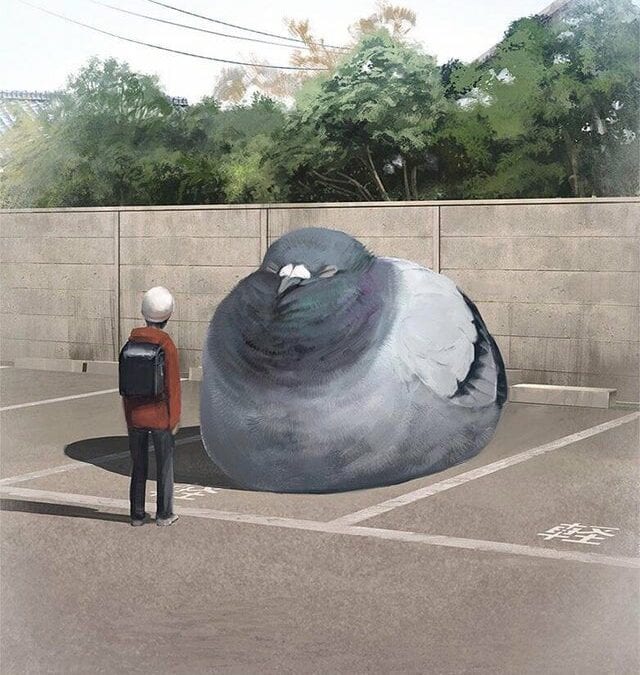
by Pigeon Patrol | Jan 25, 2022 | Columbidae, Doves, history of pigeons, MBCA, pet bird
Turning is crucial for animals, particularly during predator–prey interactions and to avoid obstacles. For flying animals, turning consists of changes in (i) flight trajectory, or path of travel, and (ii) body orientation, or 3D angular position. Changes in flight trajectory can only be achieved by modulating aerodynamic forces relative to gravity. How birds coordinate aerodynamic force production relative to changes in body orientation during turns is key to understanding the control strategies used in avian maneuvering flight. We hypothesized that pigeons produce aerodynamic forces in a uniform direction relative to their bodies, requiring changes in body orientation to redirect those forces to turn. Using detailed 3D kinematics and body mass distributions, we examined net aerodynamic forces and body orientations in slowly flying pigeons (Columba livia) executing level 90° turns. The net aerodynamic force averaged over the downstroke was maintained in a fixed direction relative to the body throughout the turn, even though the body orientation of the birds varied substantially. Early in the turn, changes in body orientation primarily redirected the downstroke aerodynamic force, affecting the bird’s flight trajectory. Subsequently, the pigeon mainly reacquired the body orientation used in forward flight without affecting its flight trajectory. Surprisingly, the pigeon’s upstroke generated aerodynamic forces that were approximately 50% of those generated during the downstroke, nearly matching the relative upstroke forces produced by hummingbirds. Thus, pigeons achieve low speed turns much like helicopters, by using whole-body rotations to alter the direction of aerodynamic force production to change their flight trajectory.
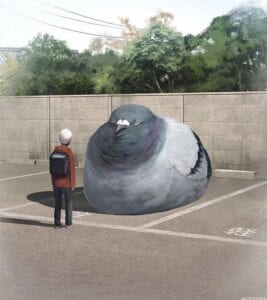
Source
Pigeon Patrol Products & Services is the leading manufacturer and distributor of bird deterrent (control) products in Canada. Pigeon Patrol products have solved pest bird problems in industrial, commercial, and residential settings since 2000, by using safe and humane bird deterrents with only bird and animal friendly solutions. At Pigeon Patrol, we manufacture and offer a variety of bird deterrents, ranging from Ultra-flex Bird Spikes with UV protection, Bird Netting, 4-S Bird Gel and the best Ultrasonic and audible sound devices on the market today.
Voted Best Canadian wholesaler for Bird Deterrent products ten years in a row.
Contact us at 1- 877– 4– NO-BIRD, (604) 585-9279 or visit our website at www.pigeonpatrol.ca
Pigeon/Pigeon Patrol / Pigeons Roosting / Vancouver Pigeon Control /Bird Spikes / Bird Control / Bird Deterrent / Pigeon Deterrent? Surrey Pigeon Control / Pest /Seagull deterrent / Vancouver Pigeon Blog / Birds Inside Home / Pigeons in the cities / Ice Pigeons/ What to do about pigeons/ sparrows , Damage by Sparrows, How To Keep Raccoons Away, Why Are Raccoons Considered Pests/ De-fence / Pigeon Nesting/ Bird Droppings / Pigeon Dropping/ woodpecker control/ Professional Bird Control Company/ Keep The Birds Away/ Birds/rats/ seagull/pigeon/woodpecker/ dove/sparrow/pidgeon control/pidgeon problem/ pidgeon control/flying rats/ pigeon Problems/ bird netting/bird gel/bird spray/bird nails/ bird guard
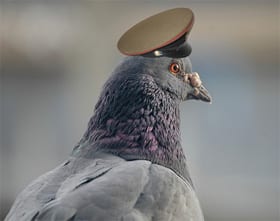
by Pigeon Patrol | Jan 25, 2022 | Bird Spike, Pigeon Spikes, Pigeons, Pigeons in the News, Raccoons, Sparrows, UltraSonic Bird Control
A freewheeling flock of birds is one of nature’s most endearing spectacles. The flock’s members move with uncanny coordination, changing direction in unison, splitting and reforming, and even landing as one. The intricacies of these synchronised flights are very difficult to entangle. Who is following whom? Is there even a leader and, if so, does the same bird always take up pole position? Our feeble eyes could never hope to discern the answers just by watching a flying flock. But fortunately, we have technology that can do the job for us.
, Budapest, has found that flying pigeons obey strict chains of command, even when in flight. He used state-of-the-art GPS devices to track the movements of groups of ten pigeons with exquisite sensitivity. The lightweight monitors, just 16g in weight, captured the subtleties of the pigeons’ twists and turns in mere fractions of a second. Back on the ground, Nagy analysed their recordings to show that pigeons fly according to the pecking orders they establish on the ground. The dominant bird takes the lead and the others follow his directions. Studying the collective movements of animal groups has been a difficult challenge. Many cameras can be used to film animals moving within the same block of space, but the jostling bodies often block one another from view. Mathematical models can tell us about the basic rules that groups of moving animals adhere to, but they are difficult to test in real life. But our technology has now become advanced enough to start skirting around these problems. For scientists studying birds, the key breakthrough was the creation of sensors that are light enough to be strapped to a flying bird without compromising its aerial abilities. Now, these sensors include GPS devices that can record a bird’s speed and direction every fifth of a second. Nagy attached such devices to 13 homing pigeons and watched as they flew in flocks of 7 to 11 birds.

Nagy catalogued every instance when one pigeon changed direction only to be followed by another. By pooling together this data, he created a network of leaders and followers, showing the relationship of each bird to its peers. This colourful diagram shows one such network. Each circle represents an individual pigeon, the arrows point from a leading bird to one that follows it, and the numbers represent the time delay between the leader’s movements and those of its follower’s. The networks showed that flocking pigeons maintain a dependable hierarchy on the wing. On average, when a leading bird changed direction, its followers would follow suit after around a third of a second. Birds will consistently copy the movements of specific individuals further up the pecking order and, in turn, they are consistently copied by more junior underlings. What makes a leading pigeon? It seems that skill counts for something. Nagy released each of his birds on a solo flight, some distance from home. When they returned, he found that those who arrived home quickest were also most likely to wield leadership authority, although this link between navigation ability and seniority wasn’t quite statistically significant. Indeed, the chains of seniority within pigeon flocks are fairly flexible, changing dynamically from flight to flight. Influential birds tend to remain influential but Tamas Vicsek, who led the study, says, “There are days when the pigeon which takes the role most of the time is less active. Perhaps it did not have a good sleep! During these days some of the birds on lower levels of the hierarchy have their chance to lead.” Nagy’s data also revealed that leaders do indeed take up pole position at the front of the flock. That may seem intuitively obvious to us, but remember that pigeons have a field of vision that extends for almost a full 360 degrees. When you can easily see individuals flying behind you, the leading bird doesn’t necessarily need to be at the front, and yet it does. More surprisingly, leaders also tend to stay on the left of the flock. Nagy found that the more time that a bird spent behind a leading partner, the more likely it was to be flying on that partner’s right. There’s an obvious reason for this – like us, pigeons have highly asymmetric brains with each half wielding greater influence over certain thought processes. Their right brain, which receives signals from the left eye, controls the ability to recognise other pigeons. So if a pigeon sees one of its peers through its left eye, rather than its right, it responds more quickly or more strongly.
Source
Pigeon Patrol Products & Services is the leading manufacturer and distributor of bird deterrent (control) products in Canada. Pigeon Patrol products have solved pest bird problems in industrial, commercial, and residential settings since 2000, by using safe and humane bird deterrents with only bird and animal friendly solutions. At Pigeon Patrol, we manufacture and offer a variety of bird deterrents, ranging from Ultra-flex Bird Spikes with UV protection, Bird Netting, 4-S Bird Gel and the best Ultrasonic and audible sound devices on the market today.
Voted Best Canadian wholesaler for Bird Deterrent products ten years in a row.
Contact us at 1- 877– 4– NO-BIRD, (604) 585-9279 or visit our website at www.pigeonpatrol.ca
Pigeon/Pigeon Patrol / Pigeons Roosting / Vancouver Pigeon Control /Bird Spikes / Bird Control / Bird Deterrent / Pigeon Deterrent? Surrey Pigeon Control / Pest /Seagull deterrent / Vancouver Pigeon Blog / Birds Inside Home / Pigeons in the cities / Ice Pigeons/ What to do about pigeons/ sparrows , Damage by Sparrows, How To Keep Raccoons Away, Why Are Raccoons Considered Pests/ De-fence / Pigeon Nesting/ Bird Droppings / Pigeon Dropping/ woodpecker control/ Professional Bird Control Company/ Keep The Birds Away/ Birds/rats/ seagull/pigeon/woodpecker/ dove/sparrow/pidgeon control/pidgeon problem/ pidgeon control/flying rats/ pigeon Problems/ bird netting/bird gel/bird spray/bird nails/ bird guard

by Pigeon Patrol | Jan 25, 2022 | Pigeon Droppings, Pigeon Patrol's Services, Pigeon Predators, Pigeon Spikes, Pigeons, Pigeons in the News
Even the bird-brained can follow a leader. When pigeons fly in flocks, each bird falls behind another with better navigational skill, and the savviest among them leads the flock, scientists report in the April 8 Nature.
The research suggests hierarchies can serve peaceful purposes in the animal kingdom, where dominance by brute force is often the rule. “A pecking order tends to be just that — a pecking order,” says Iain Couzin of Princeton University, an expert in collective behavior who was not involved in the research.
The research also suggests that for pigeons, dominance isn’t set in stone. While one bird often emerged as the leader, other birds also stepped up. This flexibility in leadership had previously been seen only in some small groups of fish.
From schools to packs to swarms to flocks, collective behavior is widespread among animals. But in many cases, the important interactions are with nearest neighbors, and control of the group’s movement is distributed among members rather than hierarchical.

Biological physicist Tamás Vicsek of Eötvös Loránd University in Budapest and his colleagues studied flight dynamics in homing pigeons, which fly in flocks but conveniently return to their roosts. The researchers outfitted 13 pigeons with tiny backpacks carrying GPS devices that measured shifts in birds’ flight direction five times per second. Flocks of eight to 10 birds flew with the devices during homing flights (a roughly 14-kilometer trip back to the roost) and spontaneous “free” flights near home. Each bird also flew solo flights of about 15 kilometers each.
Analysis of GPS logs showed that for each excursion, the flock had one leader followed by at least three or four other birds. Each of these followers was in turn followed by other birds in the flock. Comparing the solo flight paths to the group flights showed that the birds with the best navigational skills led the flock.
While flocks have hierarchies, they’re not dictatorships, notes Vicsek. One bird led eight of the 13 flights, while other birds took the lead on the rest of the trips. Vicsek likens the dynamics to a group of peers deciding where to eat dinner. “Maybe someone knows the area restaurants best, or there is a person who’s a gourmand — or maybe they are the most outspoken,” he says. This one person might pick the place to eat for several nights, although another person might chime in now and then. And then there is the person with no say, whom everyone knows has terrible taste in food.
“These pigeons know each other. They know which is the smartest. The fastest bird will even follow the slower one who knows the way home the best,” say Vicsek. Videos of the birds’ positions during flight showed that if the best navigator moves a little to the left, it takes about a third of a second for other birds to do the same. But if the least savvy bird makes a move “the others don’t care,” Vicsek says.
Pigeons’ brains may be wired for follow-the-leader, comments behavioral neuroscientist Lucia Jacobs of the University of California, Berkeley. When the left eye sees something, for example, it sends all the visual information to the right brain hemisphere, and vice versa. This “extreme lateralization” may play a role in organizing flocks, the new work suggests. A pigeon following another was most likely to be flying on its partner’s right, seeing this leader with its left eye. “It’s very cool,” Jacobs says.
Source
Pigeon Patrol Products & Services is the leading manufacturer and distributor of bird deterrent (control) products in Canada. Pigeon Patrol products have solved pest bird problems in industrial, commercial, and residential settings since 2000, by using safe and humane bird deterrents with only bird and animal friendly solutions. At Pigeon Patrol, we manufacture and offer a variety of bird deterrents, ranging from Ultra-flex Bird Spikes with UV protection, Bird Netting, 4-S Bird Gel and the best Ultrasonic and audible sound devices on the market today.
Voted Best Canadian wholesaler for Bird Deterrent products ten years in a row.
Contact us at 1- 877– 4– NO-BIRD, (604) 585-9279 or visit our website at www.pigeonpatrol.ca
Pigeon/Pigeon Patrol / Pigeons Roosting / Vancouver Pigeon Control /Bird Spikes / Bird Control / Bird Deterrent / Pigeon Deterrent? Surrey Pigeon Control / Pest /Seagull deterrent / Vancouver Pigeon Blog / Birds Inside Home / Pigeons in the cities / Ice Pigeons/ What to do about pigeons/ sparrows , Damage by Sparrows, How To Keep Raccoons Away, Why Are Raccoons Considered Pests/ De-fence / Pigeon Nesting/ Bird Droppings / Pigeon Dropping/ woodpecker control/ Professional Bird Control Company/ Keep The Birds Away/ Birds/rats/ seagull/pigeon/woodpecker/ dove/sparrow/pidgeon control/pidgeon problem/ pidgeon control/flying rats/ pigeon Problems/ bird netting/bird gel/bird spray/bird nails/ bird guard
